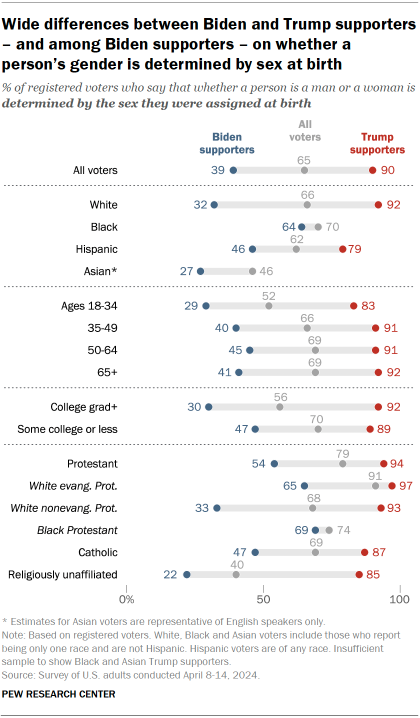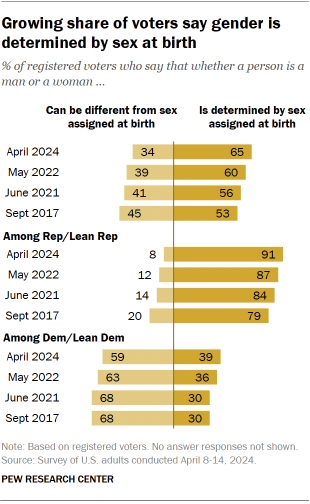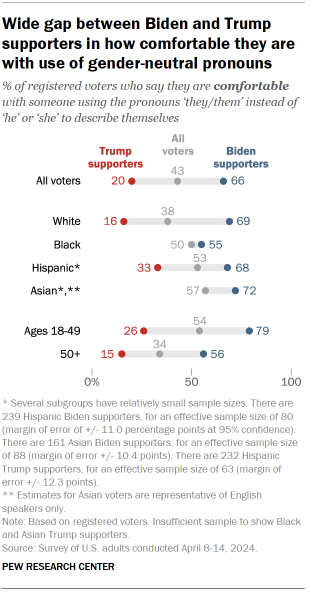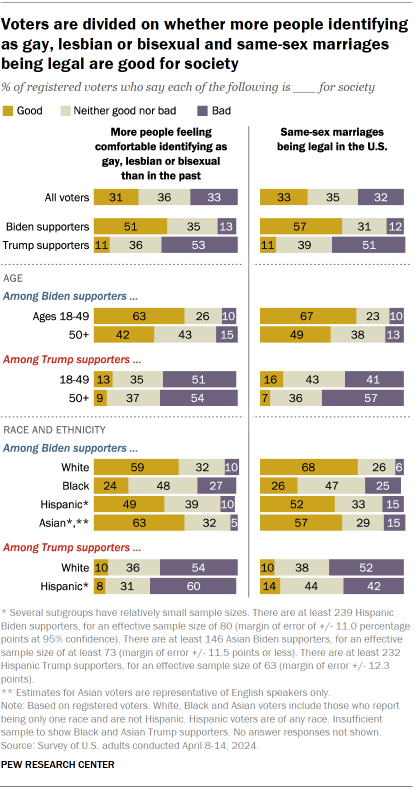Voters who support Joe Biden and Donald Trump have wide differences across a broad range of issues related to gender identity and sexual orientation.
Trump supporters overwhelmingly say a person’s gender is determined by the sex they were assigned at birth. A majority of Biden supporters, by a less one-sided margin, say someone can be a man or woman even if that is different from their sex at birth.
Biden’s supporters also are far more comfortable than Trump supporters with people using the pronouns “they” or “them” to describe themselves.
And two decades after the first same-sex marriages were legally performed in the U.S., Biden supporters are roughly five times as likely as Trump supporters to say legalizing same-sex marriage has been good for society.
Views of gender identity
Nearly two-thirds of registered voters (65%) say whether a person is a man or woman is determined by the sex assigned to them at birth. About a third (34%) say whether someone is a man or woman can be different from the sex at birth.
Nine-in-ten Trump supporters and about four-in-ten Biden supporters (39%) say sex at birth determines if someone is a man or a woman.
About six-in-ten Biden supporters (59%) say a person’s gender can be different from their sex at birth. Only about one-in-ten Trump supporters (9%) say this.
There are wider demographic differences in opinions about gender identity among Biden supporters than among Trump supporters.
Among Biden supporters

Nearly two-thirds of Black voters who support Biden (64%) say gender is determined by a person’s sex assigned at birth. That compares with 46% of Biden’s Hispanic supporters and smaller shares of his White (32%) and Asian supporters (27%).
Biden supporters without college degrees (47%) are more likely than those with college degrees or more education (30%) to say sex at birth determines someone’s gender.
Biden supporters under age 35 (29%) are less likely than older Biden supporters to say gender is determined by sex assigned at birth.
Among Trump supporters
Across demographic groups, wide majorities of Trump supporters say gender is determined by sex at birth.
However, there are some differences among these voters. Hispanic Trump supporters (79%) are less likely than White Trump supporters (92%) to say sex birth determines gender identity, and Trump supporters ages 18 to 34 (83%) are less likely to say this than older Trump supporters.
Changing views about gender identity

The share of voters who say that sex at birth determines whether someone is a man or a woman has increased since 2017, and this increase has occurred within both parties.
In 2017, 53% of voters said sex assigned at birth determines gender; 65% express this view today.
The share of Republican and Republican-leaning voters who say that sex at birth determines gender identity has grown from 79% in 2017 to 91% now.
In the same period, the share of Democratic and Democratic-leaning voters who say this has increased, from 30% to 39%.
Voters’ attitudes toward use of gender-neutral pronouns

Over half of voters (56%) say they are not comfortable with someone using the pronouns “they” or “them” to describe themselves, rather than “he” or “she.” Roughly four-in-ten (43%) are comfortable with the use of these pronouns.
Biden supporters are more than three times as likely as Trump supporters to say they are comfortable with the use of “they/them” pronouns (66% to 20%).
- Black voters who support Biden (55%) are less comfortable with the use of they/them pronouns than Biden’s White (69%), Hispanic (68%) and Asian (72%) backers.
- Hispanic Trump supporters (33%) are somewhat more likely than the former president’s White supporters (16%) to say they are comfortable.
Voters under 50 are more comfortable than those 50 and older with people using gender-neutral pronouns. There is an age gap on this question among both candidates’ supporters, but it is particularly stark among Biden voters: 79% of Biden’s supporters ages 18 to 49 say they are comfortable, compared with 56% of his supporters who are 50 and older.
Societal impact of more social acceptance of lesbian, gay, bisexual people

Voters are divided over the societal effects of more people being comfortable with identifying as gay, lesbian or bisexual and same-sex marriages being legal in the U.S.
Roughly a third say each trend has been very or somewhat good for society, while about as many say the changes have been bad for society. The remainder say they have been neither good nor bad.
As with opinions about gender identity, there are sizable differences between Biden and Trump supporters.
About half of Biden supporters (51%) say more people being comfortable identifying as gay, lesbian or bisexual is good for society. And a majority of Biden supporters (57%) say legalization of same-sex marriage is good for society.
About half of Trump supporters say both changes are bad for society: 53% say this about increased comfort with people identifying as lesbian, gay or bisexual, and 51% say this about legalization of same-sex marriage.
There are age differences among both candidates’ supporters.
- Majorities of Biden supporters ages 18 to 49 view both trends positively: 63% say more people being comfortable identifying as lesbian, gay or bisexual is good for society, while 67% say the same of the legalization of same-sex marriage. About half or fewer of Biden supporters 50 and older share these views. (This group is more likely to instead say that these trends are neither good nor bad.)
- Older Trump supporters are more likely than his younger supporters to have a negative view of the impact of legalizing same-sex marriage (57% of those 50 and older say it is bad for society, compared with 41% of those younger than 50). There are no meaningful age differences in how Trump supporters assess the impact of more people being comfortable with identifying as lesbian, gay or bisexual.
- Black voters who support Biden are far less likely than Biden’s supporters in other racial and ethnic groups to say increased comfort with identifying as lesbian, gay or bisexual and legalized same-sex marriage are good for society. About a quarter of Black Biden supporters say these things are good, compared with about half or more among his White, Hispanic and Asian backers.




